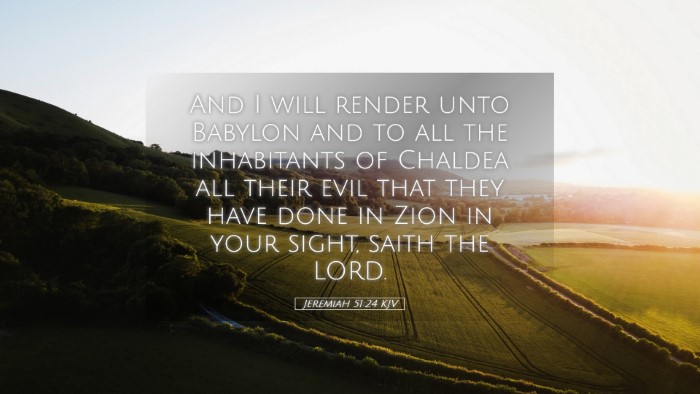Commentary on Jeremiah 51:24
Verse Reference: Jeremiah 51:24 - "And I will render unto Babylon and to all the inhabitants of Chaldea all their evil that they have done in Zion in your sight, saith the Lord."
Introduction
This verse occupies a significant position within the prophecies of Jeremiah, particularly as it relates to the impending judgment against Babylon. Various commentaries shed light on the gravity of the Lord’s declaration and the moral implications of divine justice. The following insights, drawn from notable public domain commentaries, provide a comprehensive understanding useful for pastors, students, and scholars alike.
Divine Judgment against Babylon
The overarching theme of Jeremiah 51 is the impending destruction of Babylon as a consequence of its sins against God and His people. Notably, this judgment is not arbitrary but a righteous response to the evil committed against Zion, which represents God's chosen people and His holy city.
Matthew Henry's Insights
Henry observes that God's vengeance is certain and that Babylon would not escape the repercussions of its actions. This verse encapsulates the essence of retributive justice, whereby the Lord holds nations accountable for their moral failings. He emphasizes that this decree is issued "in your sight," indicating that the judgment is publicly vindicated before those who have suffered.
Albert Barnes' Perspective
Barnes elaborates on the implications of God's statement of rendering evil to Babylon. He highlights that the inhabitants of Chaldea (another term for Babylonians) would experience recompense proportional to their misdeeds against Zion. Barnes underscores the moral order inherent in God's governance, asserting that the Lord’s retribution is guaranteed as He weighs actions with divine justice.
Adam Clarke's Commentary
Clarke provides a detailed explanation of the phrase "all their evil." He interprets this as a comprehensive judgment covering every form of wickedness perpetrated against the Israelites. Clarke emphasizes that though Babylon may have appeared powerful, its fall is assured under the sovereign will of God. He also notes that God’s promise to judge Babylon acts as both a comfort to the oppressed and a warning to oppressors around the world.
Theological Implications
The verse serves as a key reminder of the nature of God’s justice. It illustrates a fundamental theological principle that God’s judgment is not only inevitable but also meticulous, designed to address the wrongs committed by nations against His people.
Retribution in Biblical Theology
- The Principle of Retribution: The concept of retribution is deeply embedded in biblical theology, where the Lord acts as the ultimate arbiter of justice, ensuring that evil deeds do not go unpunished.
- God’s Sovereignty: This verse reflects God's sovereignty over nations. He is not only aware of injustices but actively engages in their rectification.
- The Role of the Church: For believers, this serves as a call to uphold justice and righteousness, recognizing that God’s concern for His people extends through time and history.
Implications for the Church Today
As this verse confronts the reality of divine judgment, it carries pertinent implications for contemporary readers, particularly within congregations aiming to understand their role amidst societal injustices.
Encouragement for the Oppressed
Pastors can draw from this verse to encourage those who feel oppressed or marginalized, emphasizing that God will vindicate His people just as He vowed to judge Babylon. It offers hope that justice will triumph, reinforcing the belief that God is actively involved in human history.
A Call for Holiness
The verse serves as a reminder for the church to reflect on its own moral standing. As believers, engaging in spiritual vigilance against sin is paramount. The church is called not to be complacent but to foster holiness in its community.
Conclusion
Jeremiah 51:24 encapsulates profound truths about God’s nature, His justice, and the fate of nations that turn from Him. Through the insights from Matthew Henry, Albert Barnes, and Adam Clarke, readers gain a multi-faceted perspective on the gravity of this prophecy and its continual relevance. This verse not only reinforces God’s sovereign control over history but also speaks to the heart of social justice and divine retribution. May it serve to inspire a deeper understanding and reflection among pastors, students, and scholars of the Word.


